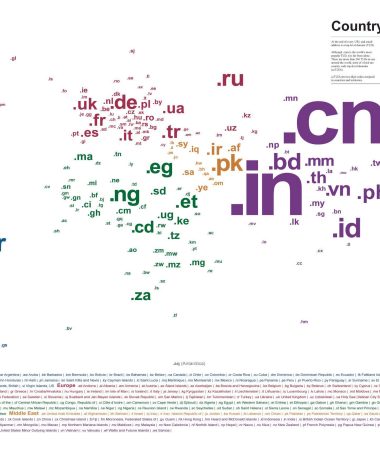When we think about the Internet, we often focus on the websites we visit, the apps we use, or the data we access. Rarely do we consider the complex infrastructure and organizations that ensure the smooth functioning of the web. One such critical organization is ICANN. But what exactly is ICANN, and why is it so essential to the functioning of the Internet? Let’s dive in.
Understanding ICANN: The Basics
ICANN stands for the Internet Corporation for Assigned Names and Numbers. It’s a non-profit organization that plays a central role in managing and coordinating the Internet’s unique identifiers globally. These identifiers include domain names (like www.example.com) and IP addresses (the unique number assigned to every device connected to the Internet).
Founded in 1998, ICANN was established to help ensure the stable and secure operation of the Internet. Before ICANN, these responsibilities were managed by a variety of organizations and volunteers under contracts with the U.S. government. As the Internet expanded, it became clear that a more formalized structure was needed to manage these critical functions.
ICANN’s Core Responsibilities
To understand the importance of ICANN, it’s essential to look at its core responsibilities:
- Domain Name System (DNS) Management
The DNS is often referred to as the “phone book” of the Internet. It translates human-friendly domain names like www.google.com into IP addresses that computers use to identify each other. Without the DNS, we would have to remember strings of numbers (IP addresses) to visit websites.
ICANN oversees the DNS to ensure it operates smoothly and without conflict. One of ICANN’s key roles is managing the root zone of the DNS, which is the highest level of the DNS hierarchy. This includes delegating control over top-level domains (TLDs) such as .com, .org, .net, and country codes like .uk or .ro.
- IP Address Allocation
Every device connected to the Internet needs a unique IP address. ICANN, through its subsidiary IANA (Internet Assigned Numbers Authority), is responsible for allocating IP address blocks to regional Internet registries (RIRs), which then distribute them to Internet service providers (ISPs) and other organizations.
With the advent of IPv6, the next-generation IP addressing scheme, ICANN’s role has become even more crucial. IPv6 provides a vastly larger address space than the older IPv4, but its implementation and management still require careful oversight.
- Protocol Parameter Assignment
ICANN also oversees the assignment of protocol parameters, which are the numerical codes and technical standards that ensure different devices and networks can communicate with each other effectively.
- Root Server Management
The root servers are a crucial component of the DNS infrastructure. They store the IP addresses of TLDs and are the first step in translating domain names into IP addresses. While ICANN doesn’t operate these servers directly, it coordinates with the organizations that do to ensure their security and reliability.
How ICANN Operates
ICANN’s structure is unique and deliberately designed to be inclusive and transparent. It’s not controlled by any single government or company but instead operates on a multi-stakeholder model. This model brings together different groups from around the world, including governments, businesses, technical experts, civil society, and end users, to participate in decision-making processes.
- The Board of Directors
ICANN is governed by a Board of Directors, which is responsible for strategic oversight and policy decisions. The board includes members from various regions and backgrounds, ensuring a diverse representation of interests.
- Supporting Organizations
ICANN’s work is supported by three key Supporting Organizations (SOs):
- Generic Names Supporting Organization (GNSO): This group focuses on policies related to generic top-level domains (gTLDs), such as .com and .net.
- Country Code Names Supporting Organization (ccNSO): This organization is responsible for policies related to country code top-level domains (ccTLDs), such as .uk for the United Kingdom or .ro for Romania.
- Address Supporting Organization (ASO): The ASO deals with IP address allocation and policy development.
- Advisory Committees
ICANN also has several advisory committees that provide input on specific issues:
- Governmental Advisory Committee (GAC): This group includes representatives from governments around the world who provide input on public policy issues.
- At-Large Advisory Committee (ALAC): This committee represents the interests of individual Internet users.
- Root Server System Advisory Committee (RSSAC): This group advises on the operation of the root name servers.
- Security and Stability Advisory Committee (SSAC): This committee offers advice on the security and stability of the Internet’s naming and address allocation systems.
The Importance of ICANN
ICANN’s work might seem highly technical and behind-the-scenes, but it’s crucial for the global Internet’s operation. Here are a few reasons why ICANN’s role is so important:
- Maintaining the Stability and Security of the Internet
Without ICANN’s oversight, the Internet as we know it could not function reliably. The DNS needs to be coordinated globally to avoid conflicts, such as two organizations trying to use the same domain name.
- Enabling Global Internet Access
ICANN’s management of IP address allocation is vital for ensuring that everyone can connect to the Internet. As the number of devices connected to the Internet grows, so does the demand for IP addresses. ICANN’s role in overseeing this allocation is critical for the Internet’s continued expansion.
- Promoting a Multi-Stakeholder Approach
ICANN’s multi-stakeholder model is a significant departure from traditional top-down governance structures. It ensures that no single entity, including governments, has complete control over the Internet. Instead, it promotes a collaborative approach that includes input from a broad range of stakeholders.
- Fostering Innovation and Competition
By managing domain name registrations and the introduction of new TLDs, ICANN helps foster innovation and competition in the domain name industry. This has led to the introduction of new gTLDs, such as .app, .blog, and many others, providing more choices for businesses and individuals.
ICANN and Internet Governance Controversies
Despite its crucial role, ICANN has not been without controversy. The organization’s unique position at the heart of the Internet’s infrastructure has made it the focus of various debates, particularly around the issues of Internet governance and control.
- US Government Oversight
For many years, ICANN operated under a contract with the U.S. Department of Commerce, leading to concerns that the U.S. government had too much influence over the global Internet. In 2016, ICANN transitioned to a fully independent organization, ending this contractual relationship and moving to a global, multi-stakeholder governance model. This transition was a significant milestone in the history of Internet governance.
- Domain Name Disputes
The management of domain names has also been a source of controversy. ICANN’s role in managing the DNS means it often has to adjudicate disputes over domain names. The introduction of new gTLDs, in particular, has led to conflicts over trademark rights and the potential for cybersquatting (registering domain names that are similar to well-known brands to profit from them).
- Privacy and Data Protection
With the advent of the General Data Protection Regulation (GDPR) in the European Union, ICANN has had to navigate the complex landscape of privacy and data protection laws. This has impacted the availability of WHOIS data, which traditionally provided public access to information about domain name registrants. Balancing transparency with privacy concerns continues to be a challenging issue for ICANN.
The Future of ICANN
As the Internet continues to evolve, so too will the challenges and responsibilities facing ICANN. The increasing importance of cybersecurity, the ongoing rollout of IPv6, and the need to balance privacy with transparency are just a few of the issues that will shape ICANN’s work in the years to come.
Moreover, as more people around the world come online, ICANN’s commitment to maintaining a free, open, and accessible Internet for all will be more critical than ever. The organization’s role in fostering global collaboration and ensuring the stable operation of the Internet’s infrastructure will remain vital as the digital landscape continues to change.
ICANN’s Global Impact and Outreach
ICANN’s influence extends far beyond just the technical aspects of Internet management. As the Internet becomes an increasingly critical part of our lives, ICANN’s role in shaping how it operates on a global scale has far-reaching implications. This influence manifests in various ways, from fostering international cooperation to promoting digital inclusion and addressing the digital divide.
- International Cooperation
One of ICANN’s key objectives is to ensure that the Internet remains a global resource, accessible and beneficial to all. To achieve this, ICANN actively engages with international organizations, governments, and other stakeholders. Its Governmental Advisory Committee (GAC), which includes representatives from over 170 countries, plays a crucial role in ensuring that the voices of different nations are heard in the policymaking process.
ICANN’s commitment to international cooperation is also evident in its approach to handling disputes and issues that arise in different regions. By working closely with regional Internet registries, national governments, and other stakeholders, ICANN ensures that its policies are implemented in a way that respects local laws and cultural contexts.
- Promoting Digital Inclusion
As the Internet continues to expand, there is a growing need to ensure that everyone, regardless of location or socioeconomic status, has access to it. ICANN plays a significant role in promoting digital inclusion by supporting initiatives aimed at expanding Internet access to underserved communities.
One such initiative is the expansion of Internationalized Domain Names (IDNs), which allow domain names to be written in non-Latin scripts, such as Arabic, Chinese, or Cyrillic. This is crucial for making the Internet more accessible to people in regions where these scripts are the norm. By supporting IDNs, ICANN helps to bridge the language barrier, making the Internet a truly global resource.
In addition to supporting IDNs, ICANN also works to address the digital divide by collaborating with various organizations to promote Internet access in developing countries. These efforts include supporting local Internet governance forums, capacity-building programs, and providing resources to help these communities participate fully in the global Internet ecosystem.
- Educational and Capacity-Building Programs
ICANN recognizes that for the Internet to remain a stable and secure resource, it is essential to educate and empower the next generation of Internet leaders and users. To this end, ICANN offers a variety of educational and capacity-building programs designed to increase awareness of Internet governance issues and build expertise in the technical aspects of Internet management.
For example, ICANN’s Fellowship Program provides training and mentorship to individuals from underrepresented regions, helping them to participate more effectively in the global Internet governance community. Similarly, ICANN’s Academic Outreach Program engages with universities and research institutions worldwide to promote the study of Internet governance and related topics.
These initiatives are critical for ensuring that the Internet remains a diverse and inclusive space, where voices from all corners of the globe can contribute to its future development.
Challenges Facing ICANN
Despite its successes, ICANN faces a number of challenges that will shape its future. These challenges stem from the evolving nature of the Internet, geopolitical tensions, and the need to balance conflicting interests within its multi-stakeholder model.
- Geopolitical Tensions
As the Internet becomes increasingly intertwined with national security and economic interests, ICANN finds itself at the center of geopolitical tensions. Different countries have varying views on how the Internet should be governed, with some advocating for more control by national governments, while others support the current multi-stakeholder model.
These tensions can manifest in various ways, from disputes over domain name management to disagreements about Internet censorship and surveillance. ICANN must navigate these complex issues carefully, ensuring that its policies are fair and that the Internet remains a global, open resource.
- Cybersecurity Concerns
The increasing frequency and sophistication of cyberattacks pose a significant challenge to ICANN’s mission of maintaining a secure and stable Internet. The DNS, in particular, is a critical target for cybercriminals, as attacks on the DNS can disrupt access to websites and online services.
ICANN has responded to these threats by strengthening its security measures and working closely with the global cybersecurity community. However, as cyber threats continue to evolve, ICANN will need to remain vigilant and adaptable, ensuring that its security protocols are robust and up to date.
- Balancing Privacy and Transparency
The tension between privacy and transparency is another significant challenge for ICANN. On the one hand, ICANN has a responsibility to maintain transparency in its operations, particularly when it comes to the availability of WHOIS data. On the other hand, there are growing concerns about privacy and data protection, particularly in light of regulations like the GDPR.
ICANN has been working to strike a balance between these competing interests by implementing changes to its WHOIS policies and exploring new models for data access. However, finding a solution that satisfies all stakeholders is a complex and ongoing process.
The Path Forward: ICANN’s Evolving Role
As we look to the future, ICANN’s role in the global Internet ecosystem is likely to evolve in response to new challenges and opportunities. Here are a few areas where ICANN’s influence is expected to grow:
- Supporting the Growth of the Internet of Things (IoT)
The rapid expansion of the Internet of Things (IoT) presents new challenges for IP address management and DNS infrastructure. With billions of devices expected to be connected to the Internet in the coming years, ICANN will play a crucial role in ensuring that the underlying infrastructure can support this growth.
This will involve not only managing the allocation of IP addresses but also ensuring that the DNS can handle the increased load and that security protocols are in place to protect IoT devices from cyber threats.
- Advancing Digital Sovereignty
As more countries seek to assert greater control over their digital infrastructure, ICANN will need to navigate the complexities of digital sovereignty. This may involve working more closely with national governments to develop policies that respect their sovereignty while maintaining the global nature of the Internet.
ICANN’s ability to facilitate dialogue and build consensus among different stakeholders will be critical in ensuring that the Internet remains a unified, global resource, rather than fragmenting into a collection of national or regional networks.
- Promoting Sustainability and Ethical Governance
As the Internet continues to grow, so too does its environmental impact. ICANN has a role to play in promoting sustainable practices within the Internet industry, from encouraging energy-efficient data centers to supporting the development of green technologies.
In addition, ICANN’s commitment to ethical governance will be increasingly important as the Internet becomes more integrated into every aspect of our lives. This includes ensuring that its policies and practices are aligned with global human rights standards and that it remains accountable to the global community.
ICANN’s Enduring Importance
So, ICANN is far more than just a technical organization. It is a central pillar of the global Internet, ensuring that the complex system of names, numbers, and protocols that we rely on every day operates smoothly and securely. Through its commitment to a multi-stakeholder model, ICANN has helped to foster a free, open, and accessible Internet that benefits people around the world.
As the Internet continues to evolve, ICANN’s role will only become more critical. Whether it’s managing the growth of the IoT, addressing cybersecurity challenges, or promoting digital inclusion, ICANN will be at the forefront of ensuring that the Internet remains a stable and secure global resource for generations to come.
Understanding ICANN and its mission is essential for anyone interested in the future of the Internet. By staying informed about ICANN’s work and engaging with its processes, we can all contribute to shaping a digital future that is inclusive, secure, and beneficial to all.










